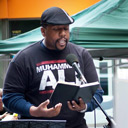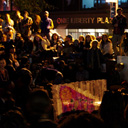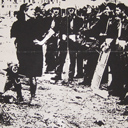
The Computer Did It? Technology and Inequality
There is nothing novel about the impact of technology on labor markets. So why do so many pundits insist on blaming computers and robots for today’s inequality?


There is nothing novel about the impact of technology on labor markets. So why do so many pundits insist on blaming computers and robots for today’s inequality?

This week brought bad news for public schools, when a California court ruled in Vergara v. California that teacher tenure laws were unconstitutional. Belabored talks to California teacher Frank Wells about the implications of the lawsuit, the motivations behind it, and why tech companies are so interested in changing schools. Plus: World Cup unrest in Brazil, a win for child care workers in Vermont, and more.

The schools of New York are now more segregated than at any point in the state’s history, and are the most segregated schools in the nation. New York City math teacher José Luis Vilson’s This Is Not A Test is a powerful account of how today’s resegregation holds back students of color—and how black and Latino teachers can fight back.

It is an old question in social movements: Should we fight the system or “be the change we wish to see”? Should we push for transformation within existing institutions, or should we model in our own lives a different set of political relationships that might someday form the basis of a new society?

Karl Polanyi, whose ideas took form in 1920s Vienna in direct opposition to the free-market orthodoxy of Ludwig von Mises, has gained belated recognition as one of the most important thinkers of the twentieth century. His central argument, contra von Mises, is that a self-regulating economic system is a completely imaginary construction, impossible to achieve or maintain.

In the post-1989 era, “there is no alternative” became not only the slogan of Poland’s economic transition but a very palpable reality. Today, as Poles celebrate #25yearsoffreedom, aggressive free-market reforms are still the order of the day, and the right is rising. So what does Poland’s post-communist generation actually have to celebrate?

Rachel Kushner’s The Flamethrowers, in many ways, is about men talking and making art, and about the ways that women experience men’s art, or become the object of it.

Rock-and-roll fans tend to see the rock culture of the 1950s and ‘60s as both a reinvention of American popular music and a force for self-expression and liberal culture. Two new books show what this account leaves out: rock and roll’s frontal assault on American racism.

As activists shine a spotlight on labor abuses surrounding the Guggenheim and NYU’s expansion to Abu Dhabi, Belabored speaks with Andrew Ross about global labor struggles and the role that the arts and academic communities can play in transnational movements for social justice. Plus: Sheryl Sandberg’s latest “Lean In” fail, Jeff Bezos as the World’s Worst Boss, Uber organizing, and more.

In the castle-like San Francisco Armory, the Internet porn production company Kink.com hosts live-streamed sex parties where unpaid “guests” are invited to perform S&M scenes for the camera. What happens when performances that once commanded a fee are done for free—and even the producers regard them not as work, but as sexual expression?

Not so long ago, the social contract between workers, government, and employers made college a calculable bet. We built a university system for the way we worked. What happens to college when that social contract is broken—when we work not just differently but for less? And what if the crisis in higher education is related to the broader failures that have left so many workers struggling?

We have developed the habit of thinking about the Declaration of Independence mainly as an event, an episode in the dramatic unfolding of the American Revolution. But it makes a cogent philosophical case for political equality, a case that democratic citizens desperately need to understand.

At first glance the runways of New York and the factories of Bangladesh couldn’t seem farther apart. But they are part of the same $1.5 trillion industry, where the work is overwhelmingly performed by young women and girls. Can a new wave of organizing, from the sweatshop floor to the offices of Condé Nast, turn that industry around?

In the latest escalation of the low-wage workers’ movement, fast food workers went out on strike this week in hundreds of cities around the globe. Sarah and Michelle speak with Tsedeye Gebreselassie of the National Employment Law Project about the importance of local victories in this global struggle, and why workers must lead the way. Plus: miners’ deaths abroad and at home, teachers’ ongoing resistance to high-stakes testing, Thomas Piketty, and more.

Few scholars have done as much as Frances Fox Piven to describe how widespread disruptive action can change history, and few have offered more provocative suggestions about the times when movements—instead of crawling forward with incremental demands—can break into full sprint.